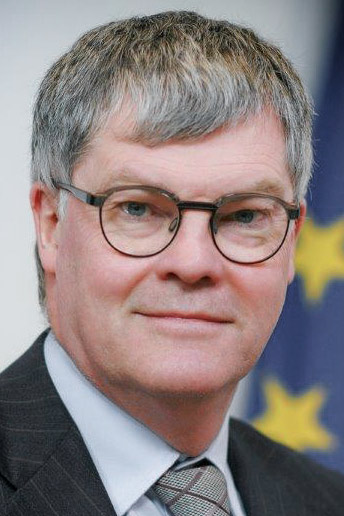

 In the world of ICANN and Internet policy, complexity is manufactured to create an illusion that issues are impenetrably technical such that normal and everyday principles can't apply. This causes a pervasive and entrenched phenomenon of eyes that glaze over at the mere mention of the word "ICANN" -- including those of government regulators and other officials that might otherwise take more of an active interest. more
In the world of ICANN and Internet policy, complexity is manufactured to create an illusion that issues are impenetrably technical such that normal and everyday principles can't apply. This causes a pervasive and entrenched phenomenon of eyes that glaze over at the mere mention of the word "ICANN" -- including those of government regulators and other officials that might otherwise take more of an active interest. more
 "The Internet is the real world now." This assessment was offered by Protocol, a technology industry news site, following the very real violence on Capitol Hill during the counting of the electoral college votes that officially determines the next president of the United States. The media outlet went on to say that, "[t]he only difference is, you can do more things and reach more people online -- with truth and with lies -- than you can in the real world." more
"The Internet is the real world now." This assessment was offered by Protocol, a technology industry news site, following the very real violence on Capitol Hill during the counting of the electoral college votes that officially determines the next president of the United States. The media outlet went on to say that, "[t]he only difference is, you can do more things and reach more people online -- with truth and with lies -- than you can in the real world." more
 2020 has been extremely eventful, so it follows that the domain industry has continued to experience perpetual change, progress and uncertainty in the last three months of the year. In our Q4 New gTLD Quarterly Report, MarkMonitor experts analyze topical registration activity, launch information, .brand growth and DNS abuse, and share a list of upcoming industry meetings for 2021. more
2020 has been extremely eventful, so it follows that the domain industry has continued to experience perpetual change, progress and uncertainty in the last three months of the year. In our Q4 New gTLD Quarterly Report, MarkMonitor experts analyze topical registration activity, launch information, .brand growth and DNS abuse, and share a list of upcoming industry meetings for 2021. more
 The Internet of Things (IoT) is on an explosive growth trajectory. According to Transforma Insights, the number of IoT-connected devices is projected to increase to 24.1 billion worldwide by 2030. That's almost a three-fold increase from 2019. Much of this growth will be fueled by the coming 5G revolution, which will enable businesses and consumers to take advantage of a wide range of increasingly sophisticated connected devices. more
The Internet of Things (IoT) is on an explosive growth trajectory. According to Transforma Insights, the number of IoT-connected devices is projected to increase to 24.1 billion worldwide by 2030. That's almost a three-fold increase from 2019. Much of this growth will be fueled by the coming 5G revolution, which will enable businesses and consumers to take advantage of a wide range of increasingly sophisticated connected devices. more
 The domain name system is not the place to police speech. ICANN is legally bound not to act as the Internet's speech police, but its legal commitments are riddled with exceptions, and aspiring censors have already used those exceptions in harmful ways. This was one factor that made the failed takeover of the .ORG registry such a dangerous situation. But now, ICANN has an opportunity to curb this abuse and recommit to its narrow mission of keeping the DNS running... more
The domain name system is not the place to police speech. ICANN is legally bound not to act as the Internet's speech police, but its legal commitments are riddled with exceptions, and aspiring censors have already used those exceptions in harmful ways. This was one factor that made the failed takeover of the .ORG registry such a dangerous situation. But now, ICANN has an opportunity to curb this abuse and recommit to its narrow mission of keeping the DNS running... more
 How much phishing is there? Where is it occurring, and why? How can it be reduced? I and my colleagues at Interisle Consulting have just published a new study called Phishing Landscape 2020, designed to answer those questions. We assembled a deep set of data from four different, respected threat intelligence providers and enriched it with additional DNS data and investigation. The result is a look at phishing attacks that occurred in May through July 2020. more
How much phishing is there? Where is it occurring, and why? How can it be reduced? I and my colleagues at Interisle Consulting have just published a new study called Phishing Landscape 2020, designed to answer those questions. We assembled a deep set of data from four different, respected threat intelligence providers and enriched it with additional DNS data and investigation. The result is a look at phishing attacks that occurred in May through July 2020. more
 I am glad to announce that the European Commission has officially launched the process to select the next Registry for the .eu Top-Level Domain (TLD). This is done through a competitive procedure that will be concluded, by October 2021, with the signature of a service concession contract between the European Commission and the entity that will be entrusted with the organisation, administration and management of the .eu TLD. more
I am glad to announce that the European Commission has officially launched the process to select the next Registry for the .eu Top-Level Domain (TLD). This is done through a competitive procedure that will be concluded, by October 2021, with the signature of a service concession contract between the European Commission and the entity that will be entrusted with the organisation, administration and management of the .eu TLD. more
 As the third quarter of 2020 winds down, the domain industry continues to show development and progression amid uncertain global economic conditions. From improvements in products and additional TLD launches to growth in .brand email usage and upcoming virtual meetings, the Q3 2020: New gTLD Quarterly Report from our MarkMonitor team has a little something for everyone. more
As the third quarter of 2020 winds down, the domain industry continues to show development and progression amid uncertain global economic conditions. From improvements in products and additional TLD launches to growth in .brand email usage and upcoming virtual meetings, the Q3 2020: New gTLD Quarterly Report from our MarkMonitor team has a little something for everyone. more
 Afilias has informed registrars and registry clients that it is taking steps to remove orphan glue records from 200+ TLD zones in its care. This will eliminate the potential for a handful of domain names to be misused. "Glue records" enable websites and other uses of domain names to work on the internet. They are related to DNS domain name delegations and are necessary to guide iterative resolvers to delegated nameservers. more
Afilias has informed registrars and registry clients that it is taking steps to remove orphan glue records from 200+ TLD zones in its care. This will eliminate the potential for a handful of domain names to be misused. "Glue records" enable websites and other uses of domain names to work on the internet. They are related to DNS domain name delegations and are necessary to guide iterative resolvers to delegated nameservers. more
 ICANN's founding promise and mandate are optimistic -- ensure a stable and secure internet that benefits the internet community as a whole. Recent months, however, have highlighted the uncomfortable truth that ICANN's and the industry's approach to DNS abuse is actually moving backward, ignoring growing problems, abdicating on important policy issues, and making excuses for not acting. Further, the impending failure of ICANN's new WHOIS policy to address cybersecurity concerns will add fuel to the fire, resulting in accelerating DNS abuse that harms internet users across the globe. more
ICANN's founding promise and mandate are optimistic -- ensure a stable and secure internet that benefits the internet community as a whole. Recent months, however, have highlighted the uncomfortable truth that ICANN's and the industry's approach to DNS abuse is actually moving backward, ignoring growing problems, abdicating on important policy issues, and making excuses for not acting. Further, the impending failure of ICANN's new WHOIS policy to address cybersecurity concerns will add fuel to the fire, resulting in accelerating DNS abuse that harms internet users across the globe. more
 Ethos Capital has recently announced that it has voluntarily proposed to add an amendment to Public Interest Registry's (PIR) .ORG Registry Agreement with ICANN in the form of a Public Interest Commitment, also known as a "PIC." In the press release Ethos indicated that the PIC would become "legally binding" and "enforceable" both by ICANN and by members of the community. I anticipate that some would ask a number of logical questions: How would that work in practice? more
Ethos Capital has recently announced that it has voluntarily proposed to add an amendment to Public Interest Registry's (PIR) .ORG Registry Agreement with ICANN in the form of a Public Interest Commitment, also known as a "PIC." In the press release Ethos indicated that the PIC would become "legally binding" and "enforceable" both by ICANN and by members of the community. I anticipate that some would ask a number of logical questions: How would that work in practice? more
 When I began writing about the dot-org sale, it was out of concern for the loss of what I felt strongly was long understood to be a unique place in the Internet's landscape. Like a national park, dot-org deserved special protection. It turns out lots of people and organizations agreed. On April 30th, 2020, The ICANN Board upheld these values. They unanimously withheld consent for a change of control of the Public Interest Registry to a private equity firm. more
When I began writing about the dot-org sale, it was out of concern for the loss of what I felt strongly was long understood to be a unique place in the Internet's landscape. Like a national park, dot-org deserved special protection. It turns out lots of people and organizations agreed. On April 30th, 2020, The ICANN Board upheld these values. They unanimously withheld consent for a change of control of the Public Interest Registry to a private equity firm. more
 In a move, unprecedented in scale, ISOC moved to sell PIR, the registry for .ORG, to a for-profit entity which intends, in turn, to convert PIR into a for-profit entity itself. This move has, understandably, raised concerns from around the Internet community and cast a bright light on ICANN, the nature of its contracts with Registries and the responsibilities of the ICANN Board... As the Vice Chair for Policy of the At-Large Advisory Committee (ALAC), I've tried to navigate a consensus involving ALL of those parties because of our diverse membership. more
In a move, unprecedented in scale, ISOC moved to sell PIR, the registry for .ORG, to a for-profit entity which intends, in turn, to convert PIR into a for-profit entity itself. This move has, understandably, raised concerns from around the Internet community and cast a bright light on ICANN, the nature of its contracts with Registries and the responsibilities of the ICANN Board... As the Vice Chair for Policy of the At-Large Advisory Committee (ALAC), I've tried to navigate a consensus involving ALL of those parties because of our diverse membership. more
 Later this week, ICANN is finally going to vote on the proposed sale of .ORG to Ethos Capital. It will decide the future owner of .ORG, but the decision will also provide a window into whether ICANN will remain independent of the U.S. government. It's a big decision, one that can strengthen both ICANN and the NGO community on the web, if we get it right. For nearly a decade, the ICANN community fought hard to untether itself from the U.S. Department of Commerce. more
Later this week, ICANN is finally going to vote on the proposed sale of .ORG to Ethos Capital. It will decide the future owner of .ORG, but the decision will also provide a window into whether ICANN will remain independent of the U.S. government. It's a big decision, one that can strengthen both ICANN and the NGO community on the web, if we get it right. For nearly a decade, the ICANN community fought hard to untether itself from the U.S. Department of Commerce. more
 This week, the ICANN Board will vote on whether to approve the transfer of control of the .ORG domain to a private equity firm called Ethos Capital. This is a weighty decision for ICANN, since in order to approve the sale, it will have to convince itself that this is the right choice in the face of tremendous and widespread opposition, including from those who will be most affected by the sale. more
This week, the ICANN Board will vote on whether to approve the transfer of control of the .ORG domain to a private equity firm called Ethos Capital. This is a weighty decision for ICANN, since in order to approve the sale, it will have to convince itself that this is the right choice in the face of tremendous and widespread opposition, including from those who will be most affected by the sale. more